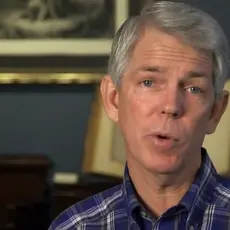Last week, David Barton spoke at at an event hosted by the South Dakota Family Policy Council. Before the event, he sat down for an interview with The Dakota Voice during which this exchange took place:
Among all the people today pushing the revisionist picture of our history that most of the founders were deists, that America was not founded on Christian principles, how many of those do you believe are merely ignorant of the facts and are only parroting other misinformation they’ve heard, and how many actually know better and are intentionally trying to distort history?
I think there’s a lot of both. I was involved in writing an academic book with three other professors. They said there is no question that America’s founders weren’t religious, because Thomas Jefferson started the first secular university, wouldn’t allow chaplains and such. But I said that’s interesting because I have here the original ads for the University of Virginia that ran in the newspaper. The ads were signed by the chaplain and there were about nine or ten specific things Thomas Jefferson did to make sure every student had a religious activity. These professors were shocked and said, “That’s not what we were taught.” [Emphasis added.]
Three other professors? Considering that Barton's academic credentials consist entirely of a "B.A. from Oral Roberts University and an Honorary Doctorate of Letters from Pensacola Christian College," I'm a little confused as to how Barton managed to write a book with three other professors since Barton is not, you know, actually a professor; he's a Religious Right activist.
Anyway, the conversation then turned toward the inevitable "how did conservative Christians lose control of America" question, for which Barton had a simple explanation - Darwin, prohibition, and Herbert Hoover:
I think we really goofed it up starting in the 1920s, and it was the church that did it ... I’ll point to several things. In 1859 you had the Origin of Species, and I don’t know why people think Darwin was the father of evolution because all he did was take 2,300 years of evolutionary thought and simplify it. But for the next 20 years the church had real trouble with that. In about 1879 you’ll find major splits in most denominations, and the splits started saying, “Well, we’re not sure about the Bible and science and the culture, but we do know God wants people saved so we’re going to go preach the Gospel.” The other side said, “No, the Bible is right; science will come around.” This side said the Bible is fundamental to everything in life: media, culture, science.
Following that you had three major political setbacks in the 1920s. Those setbacks start with the repeal of prohibition, which was a direct slap at the church. You have the Scopes “Monkey” Trial, which was the trial that essentially lost the war, the media beat the dickens out of us and made Christians look like dummies. And the third one was actually the election of Herbert Hoover. Christians like Billy Sunday campaigned all across America in whistle stop tours. Hoover gets elected, the depression comes, and the critics said, “Look what you Christians did; you caused the depression. You Christians need to stay out of politics.”
About that time we stared pulling our kids out of the pulpit, “Kids, you want to do something good for God? Be a pastor, be a missionary, but don’t be anything in education, law or politics. So we bailed out. So in bailing out, somebody has to fill those arenas, and they got filled.
There are really five power centers in any culture, and we gave up for and a half of them. We gave up media and entertainment, we gave up government which is the judiciary and law, we gave up education, and we gave up business. What we still had left was pulpit, and we essentially gave up half of that. We’ve taken the Great Commission to be a mandate for salvation, when the Great Commission says to teach them everything I taught you. Jesus has economic teachings, he has social teachings, government teachings, but we don’t do that.
But getting any institution back takes 30 or 40 years, and that’s where we are now.





